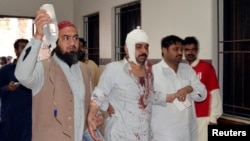The attack on a Shi'ite mosque in Peshawar that killed 20 people Friday came two weeks after another devastating attack on a Shi'ite mosque in Shikarpur in southern Pakistan that killed 60.
The Taliban in Pakistan claimed responsibility for the latest attack, carried out by suicide bombers and gunmen.
Sectarian violence, mostly targeting Shi'ites, is not new to Pakistan. It has, however, been rising over the last decade — a trend some political analysts in the country blame on the rise of anti-Shi'ite militant groups, particularly in Punjab, the most populous province. The government has banned most of these organizations, yet they operate freely under new names, said Imtiaz Alam, secretary-general of the South Asian Free Media Association.
According to South Asia Terrorism Portal, a website that tracks terrorism and sectarian violence in Pakistan, the country recorded 525 sectarian killings in 2013, up from 18 in 1989.
This year has had a bloody start, with almost 100 already dead in sectarian attacks. However, some analysts, like Imtiaz Gul, executive director of the Center for Research and Securities Studies in Islamabad, hesitate in putting Friday’s attack in this category.
Gul said he thought the Pakistani Taliban were picking soft targets to instill fear and confuse intelligence agencies in response to the government’s actions and the military’s operation against militants in tribal areas.
Afzal Shigri, a former inspector general of police from Sindh province, said that could be true. But he added that it didn't negate the sectarian nature of the attack. The Taliban are anti-Shi'ite, said Shigri, and for them violence against Shi'ites serves all those purposes.
Alam of the media association said he thought the government was not as sensitive to instances of sectarian violence because it is “politically aligned with anti-Shi'ite elements” in Punjab. “Nobody’s arrested. Nobody’s stopped,” he said Friday, saying that action against Punjabi groups is just not as strong as it is against the Pakistani Taliban in tribal areas.
Political connections aside, the country also faces a resource and capacity issue. The entire criminal justice system — the police, prosecution, courts and prisons — badly needs an overhaul to effectively deal with the menace of terrorism, Shigri said. Until that happens, he said, incidents like Friday’s attack will continue.
Some security experts said Pakistan’s counterterrorism strategy was not comprehensive enough to take on the challenges it faces. Gul argued that the current policy and actions taken under it were akin to treating the symptoms while ignoring the disease.
The real malaise, he said, flows from Pakistan’s foreign policy toward India and Kashmir. “That had given birth to this jihadist industry, which has now splintered into pro-al-Qaida, pro-ISIS [Islamic State] groups,” he said.
He said he thought Pakistan needed to reset its relationship with India. On the flip side, he said, India also needs to hold back and give Pakistan some space to implement the policies that it says it is pursuing.




